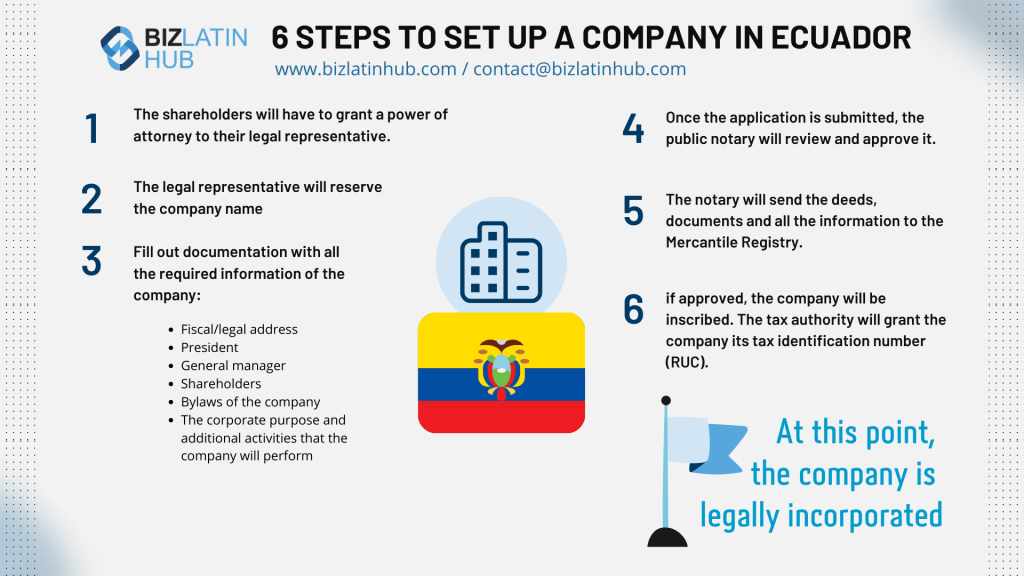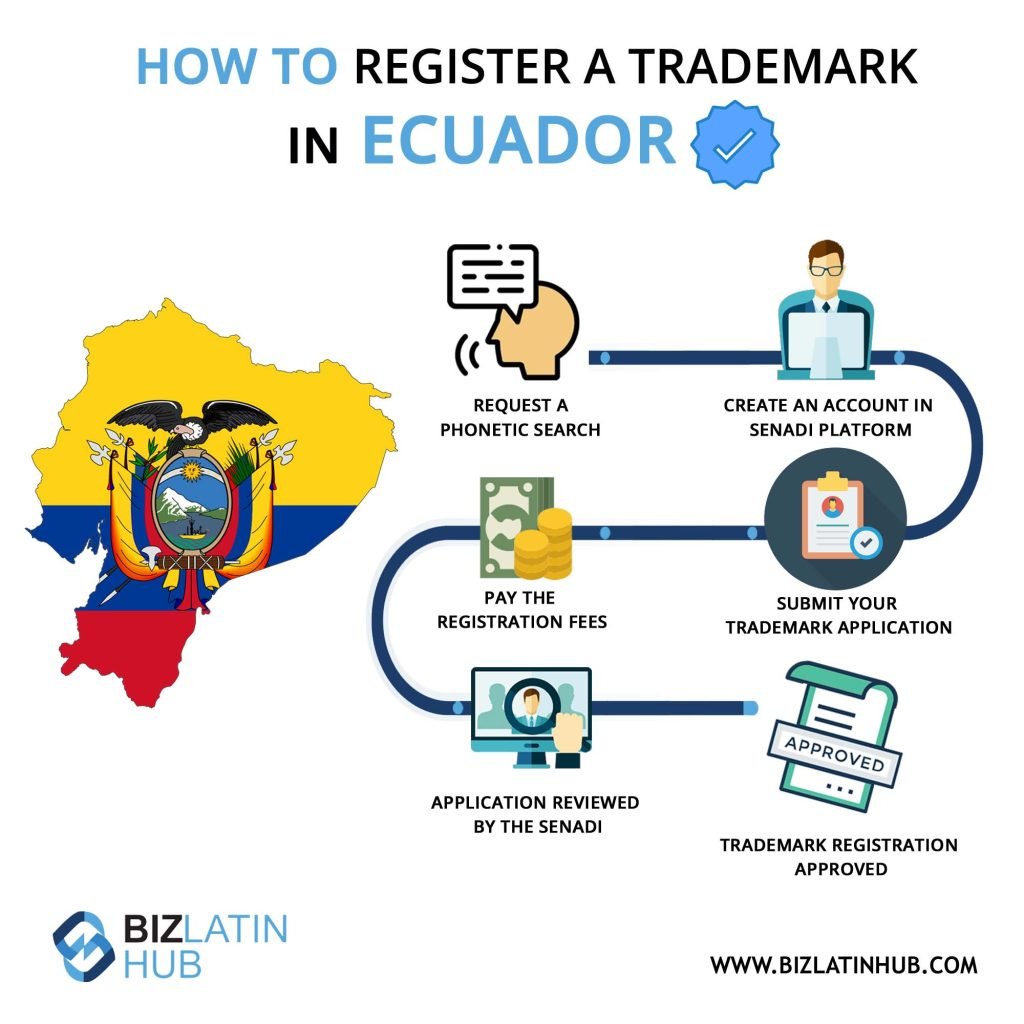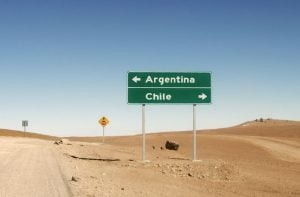Thinking about doing business in Ecuador in 2025? Learn the steps for starting a company, key compliance requirements, and the most promising sectors for foreign investment.
Doing business in Ecuador in 2025 is becoming increasingly attractive due to its improving business climate, strategic trade agreements, and growing sectors like clean energy, agribusiness, and tech. Ecuador’s economy is the eighth largest in Latin America, with a gross domestic product (GDP) of $107.44 million (USD) in 2019. While services are key to the economy, the South American country also has abundant petroleum reserves, with oil drilling accounting for 40 percent of the country’s export income and one-fourth of public budget revenues in recent years. Companies doing business in Ecuador benefit from access to dollarized stability, bilateral trade opportunities, and competitive labor and operational costs.

The Ecuadorian government also recently announced significant efforts to stimulate commerce and investment. So if you are considering business formation in Ecuador, read on to learn about the five considerations you’ll want to keep in mind to support your endeavor.
Ecuador’s business-friendly approach
The government of Ecuador has taken numerous measures to strengthen the private sector and promote economic growth, bolstered by a $10.2 billion (USD) funding agreement struck in 2018 with the International Monetary Fund (IMF) intended to correct fiscal imbalances and improve the efficiency of public finances.
Foreign investors doing business in Ecuador are targeting sectors like energy, mining, agribusiness, software development, and export-oriented manufacturing. Within this package of reforms, several benefits emerged for foreign companies that set up a business in Ecuador, including:
- Simplification of the processes to establish a company in Ecuador
- Digitization of the processes to establish a business in the country
- Improved connectivity between business registers
- Reduction of procedures and tax requirements to form a company
5 Key considerations to start a business in Ecuador
Anyone thinking about starting a business in Ecuador should take the following considerations into account:

1. Choose the right company type: You must determine what type of company will fit your business needs before settling in the country. Note that in Ecuador there are several types of companies such as a joint-stock company (Sociedad Anónima), a limited liability company (Sociedad de Responsabilidad Limitada), and a simplified stock company (Sociedad Anónima Simplificada).
2. Appoint a reliable legal representative: You must appoint a legal representative in Ecuador, who will be in charge of representing the company and signing legal documents in labor and civil matters. Please note that this person must reside in Ecuador.
3. Register before tax authorities: All companies in Ecuador must register with the Internal Revenue Service (SRI) and pay taxes on a monthly or semi-annual basis. Therefore, you must engage with a local trusted advisor when starting a business in Ecuador to ensure full compliance with tax authorities.
4. Comply with labor regulations: It is vital to understand the monthly and annual obligations that an employer must meet with its employees. These obligations include the payment of social security per employee, the payment of bonuses in the middle, and at the end of the year, vacations, pregnancy leave, disability, and severance payments.
5. Protect your intellectual property: Your company name and logo must be protected to avoid the risk of your competition emulating them. Therefore, it is always advisable to know what the options are to protect them.
Why Ecuador Is a Competitive Market for Business in 2025
Ecuador is positioning itself as a business-friendly destination in 2025, with reforms to attract foreign investment and boost private-sector development. The country’s use of the U.S. dollar eliminates currency risk, and new trade agreements and tax incentives are creating long-term business opportunities.
Top reasons to consider doing business in Ecuador:
- Dollarized economy – Transactions in USD reduce currency volatility and attract international investors.
- Free trade agreements – Agreements with China, the U.S., and the European Union create new export and supply chain opportunities.
- Strategic location – Access to both Pacific ports and Andean markets makes Ecuador ideal for regional logistics.
- Sustainable development push – The government is prioritizing renewable energy, clean agriculture, and responsible tourism.
- Startup and innovation incentives – Quito and Guayaquil are emerging as startup hubs, with support programs for tech and green enterprises.
Local Tip:
While incorporation can be completed in under a month, foreign investors should be aware that labor and tax compliance in Ecuador is detail-intensive — having a bilingual local team is key.
Company formation in Ecuador
Doing business in Ecuador requires registration with the Superintendencia de Compañías, obtaining a RUC (tax ID), and meeting compliance requirements with the SRI (tax authority) and IESS (social security system).
To form a company in Ecuador, foreign investors must select a legal structure (commonly a Sociedad de Responsabilidad Limitada or Sociedad Anónima), draft incorporation documents, register with the Superintendence of Companies, obtain a tax ID (RUC) from the SRI, and open a corporate bank account. It typically takes 3–5 weeks with proper legal guidance.
FAQs on doing business in Ecuador
Answers to some of the most common questions we get asked by our clients.
1. Can a foreigner own a business in Ecuador?
Yes, a business can be 100% foreign-owned by either legal persons (legal entities) or natural persons (individuals).
2. Are there Free Trade Zones in Ecuador?
| Special Economic Zones can be utilized for growth in the country and allow businesses exemption from corporate taxation and tariffs when importing/exporting. |
3. How long does it take to register a company in Ecuador?
The incorporation process usually takes around one to two weeks, depending on various factors such as the complexity of the company structure and the efficiency of the registration authorities.
4. Which sectors are important in Ecuador?
For much of the 20th century, Ecuador’s economy was powered by its agricultural products, with the country becoming a renowned producer of commodities such as coffee, cocoa, rice, potatoes, sugarcane, pork, beef, bananas, dairy, fish, and shrimp. Whilst agriculture and its processed foods industries remain an important part of its economy today, generating an estimated $USD1.8 billion annually, foreign investment and diversification have encouraged new businesses across a range of industries to take dominance, adding to the country’s GDP.
The development of new technologies and the ongoing push to combine innovation with sustainability has brought about opportunities in oil, which currently accounts for around 50% of the country’s exported goods. With large natural petroleum reserves, Ecuadorian firms are able to extract around 500,000 barrels of oil a day, of which 90% is exported to foreign countries. According to the latest data, the country has around six and a half billion barrels of oil in reserve, meaning countless opportunities for other businesses to exploit its reserves.
5. Does Ecuador have trade agreements with other countries?
is a member of the Community of Andean Nations. There are free trade agreements with EFTA, Mercosur and China, among others
6. What entity types offer Limited Liability in Ecuador?
In Ecuador the S.R.L (Sociedad de Responsabilidad Limitada) is a limited liability entity type.
7. Is Ecuador a good place to start a business in 2025?
Yes. Ecuador offers dollarized stability, free trade access, affordable labor, and government incentives for exporters and innovators.
8. How long does it take to register a company in Ecuador?
| On average, 3 to 5 weeks with the help of a local legal team and prepared documentation. |
9. What sectors are growing in Ecuador?
Clean energy, sustainable agriculture, mining, BPO, software development, and international logistics are among the top sectors in 2025.
Launch your business in Ecuador with help from Biz Latin Hub
If you are interested in starting a business in Ecuador seek professional support to avoid problems or delays in the process and ensure that all legal and corporate tax corporate requirements are met. If you’re planning on doing business in Ecuador in 2025, Biz Latin Hub offers complete support with company formation, compliance, and market entry strategy.
At Biz Latin Hub, our team of multilingual legal and tax specialists has extensive experience supporting foreign investors with company formation, recruitment, and many other professional services in Ecuador. With our full suite of market entry and back-office services, we are your single point contact to ensure the success of your business expansion in Latin America and the Caribbean. Reach out to us now or personalized assistance.
Learn more about our team and expert authors, and check out our short video below on how to form a company in Ecuador.






